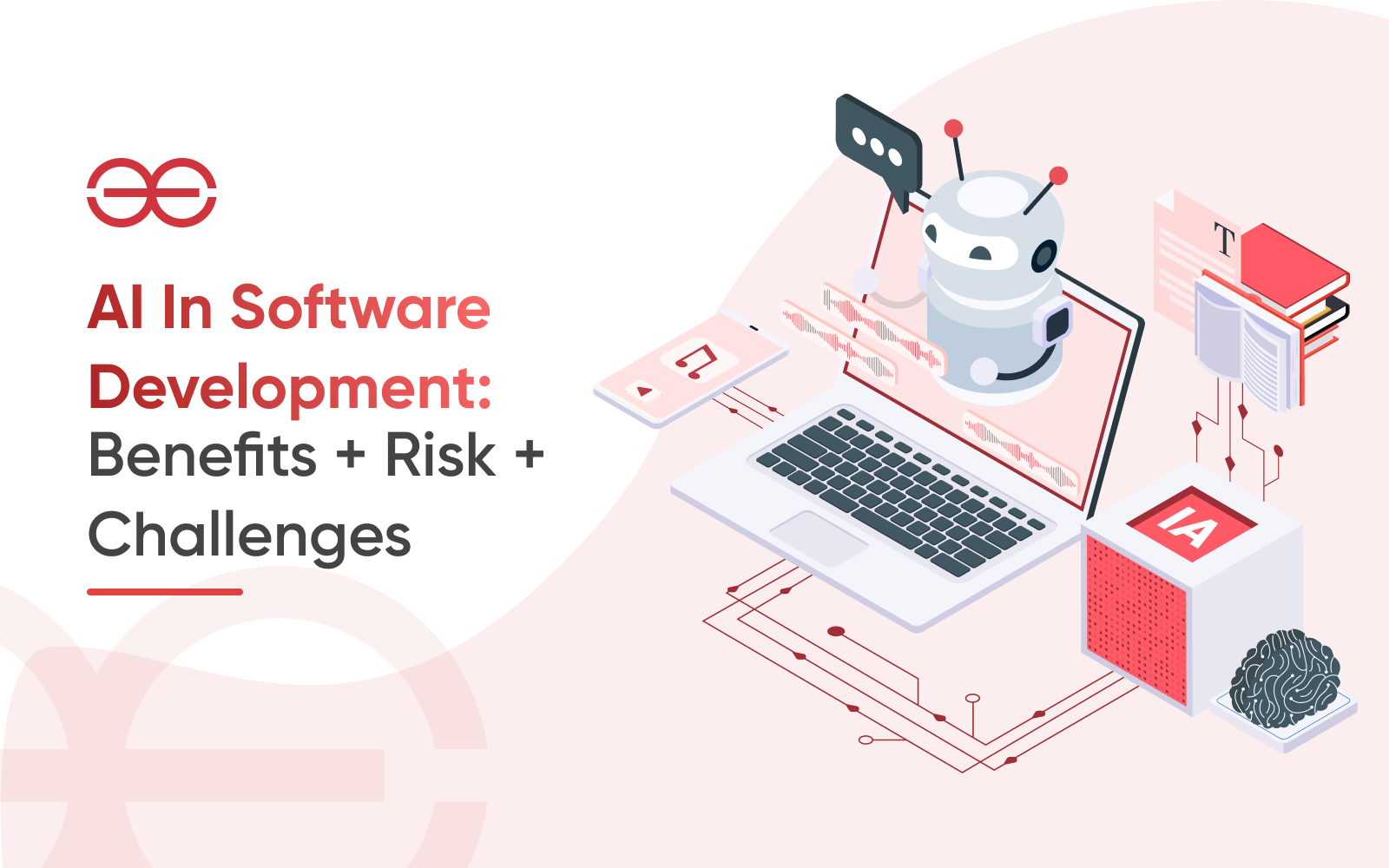Have you ever wondered what it would be like to have a super smart AI assistant as your coding buddy? One that can automate all the boring stuff and catch pesky bugs before you even notice them? Well, that’s the exciting potential of using AI in software development. With AI-powered tools, software developers can work smarter… not harder.
But before we get too hyped up… we need to look at the bigger picture. While generative AI can definitely make developers’ lives easier by handling tedious tasks and optimizing code, there are some risks to consider too. And let’s not forget the challenge of seamlessly integrating AI into existing development processes.
In this blog post, we are going to explore the potential benefits of AI in development and not-so-awesome challenges. But we’ll also keep it real and explore the risks that come along with this technology.
Let’s get into it!
5 Benefits of Using AI in Software Development
Indeed, AI is quickly becoming a must-have tool in every developer’s utility belt. By using the power of machine learning and advanced algorithms, AI can easily amplify human capabilities in remarkable ways – From intelligent code generation and automated testing to continuous optimization and lightning-fast delivery cycles.
Let’s explore some of the biggest advantages of AI in detail:
- Automated Code Generation and Intelligent Autocompletion
One of the biggest perks of having an AI in software development is that it can literally write code for you! Using techniques like natural language processing, AI tools can turn your plain English descriptions into working code snippets. Sounds amazing, no?
Believe it or not but this automated code generation is a time-saver, especially for repetitive coding tasks. But it gets even better – AI code assistants also provide intelligent autocompletion as you type, suggesting the next logical lines of code based on context and best practices. It’s like having a super smart pair programmer finishing your sentences!
- Super-Powered Testing and Debugging
There’s good news for custom software development services providers… AI-powered testing tools can automatically generate test cases, and make up all kinds of real-world scenarios to thoroughly validate your code. And when certain errors do pop up, AI debugging assistants can quickly identify the root cause by analyzing stack traces, variable values, and execution paths.
Truly incredible… Some tools even offer automatic error-fixing suggestions! Keep in mind, that AI in digital transformation is playing a crucial role.
- Streamlining Workflows and Automating Tasks
From code reviews to dependency management, there are so many little tasks that take up your precious time… obviously as a developer. But with AI, you can automate all those fiddly processes. AI code reviewers can assess code quality, compliance, and styling consistency – way faster than humans. AI bots can take care of updates, security patches, and refactoring changes by themselves, allowing developers to focus on fun and creative problem-solving tasks.
- Continuous Optimization and Refactoring
You know that feeling when you look back at the code you wrote months ago and cringe? Well, AI in software development can save you from future cringes by continuously optimizing and refactoring your codebase. In addition, smart AI tools analyze your code in real-time, identifying performance bottlenecks, and outdated patterns. Then, they automatically suggest (or even implement) optimizations to keep your code clean, secure, and fast.
-
Faster Delivery and Time-to-Market
At the end of the day, what do all these AI productivity boosters are for? Of course, Faster software delivery cycles! With AI assistants automating tasks, catching errors early, and optimizing code, developers can pump out high-quality solutions at breakneck speeds… not even kidding!
Undoubtedly, this accelerated time-to-market is a massive competitive advantage in the fast-paced world of software. Your staff augmentation team can quickly validate ideas, push updates, and beat competitors to market with innovative new products and features.
Potential Risks and Challenges Using AI in Software Development
While generative AI offers potential benefits for software developers…. Remember, we can’t let ourselves get caught up in the hype without considering the potential downsides. So, here are potential risks and challenges that developers must be aware of:
- Biased Outcomes
You know it AI models learn from huge datasets. If those training datasets contain human biases (which they often do), the AI could easily pick up those very same twisted perspectives. For example, an AI assistant trained mostly on code written by dudes could start favoring coding styles and practices preferred by male developers.
- The “Black Box” Mystery
Some of the strongest AI models are like complicated black boxes. We can see what we put in and what comes out, but we can’t see how it makes decisions in the middle. This makes it really hard to understand why AI tools do what they do, check if they’re giving good advice, or fix problems caused by not knowing what’s going on inside. Not exactly ideal for mission-critical software!
- New Cybersecurity Nightmares
While AI in software development can find regular software problems, but it might also create new ways for hackers to attack. We have to worry about tricks that trick AI systems and bad people changing AI models. As we use AI more, we have to work extra hard to keep these new AI risks safe.
- Pulling the Emergency Brake
As AI gets smarter and more capable, we need robust ways to hit the brakes if things go wrong. Experts are figuring out how to keep AI following human values and avoid unintended harm as it gets better. We don’t want a situation where AI keeps improving endlessly and ends up focusing on strange goals.
- Integrating AI into Existing Processes
Well… you can’t just drop in an AI tool and expect everything to click seamlessly. Processes like code reviews, testing, deployment, etc. may need fixing to accommodate AI’s role. Moreover, there are cultural hurdles too – some developers may be resistant to give control and decision-making to machines. In a nutshell, smoothly integrating AI without disrupting everything is a big challenge.
- The Ethics Minefield
The choice of AI in software development can affect many people, so we need strong ethical rules. But deciding what’s right for AI is tricky. Should it protect privacy or keep people safe? How do we stop biases in AI? And who’s responsible if AI messes up? Hence, figuring out ethics and accountability for AI is a big legal and philosophical challenge.
- Managing the Human-AI Divide
Although AI handles more developers’ tasks, but we can’t completely remove humans from the loop. To be very honest, we need systems that humans can control. But striking the right balance between human expertise and AI capabilities is tricky. How much decision-making do we cede to machines? How do we upskill humans to collaborate with AI? These are tough questions.
Bottom Line
AI is designed to fundamentally transform the software development landscape, supercharging productivity, optimizing code quality, and accelerating delivery cycles. With intelligent code generation, automated testing, and continuous refactoring, AI has the potential to be a developer’s force multiplier.
That’s good news, though… However, we must be aware of the risks. The road ahead requires a balanced and responsible approach while proactively mitigating pitfalls. Moreover, you need robust AI governance frameworks and interdisciplinary collaboration between technical and ethical teams.
Ultimately, by being mindful of risks and challenges, the software industry can drive innovation through the human-AI combo, unlocking new frontiers of productivity and problem-solving capability.
After reading this if you think you need custom software development services integrated with AI – Geeks of Kolachi can do wonders for you.
Happy Reading! 🙂

